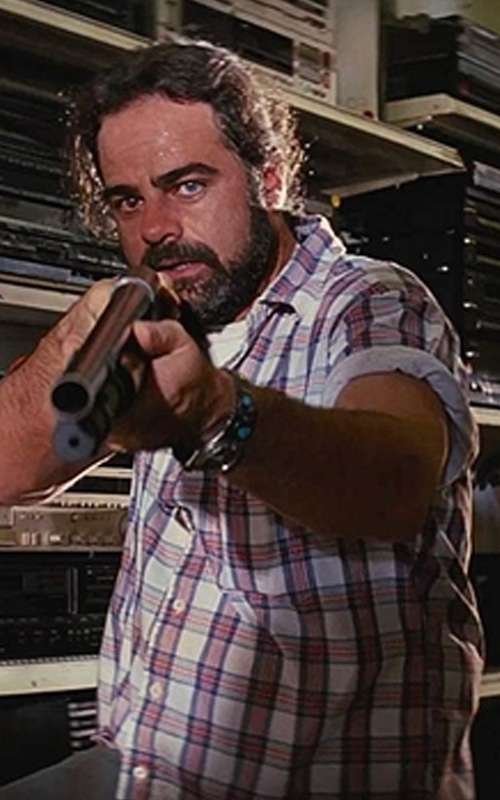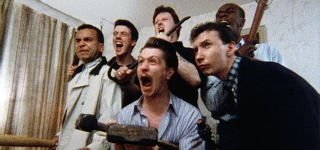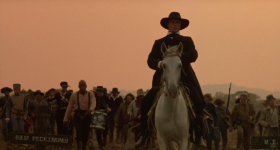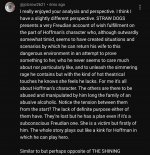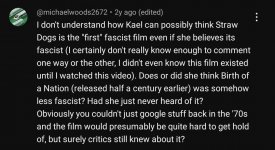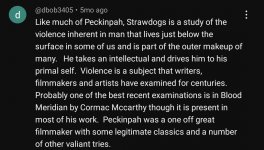Ian Scuffling
Well-known member
Noticed version posts a lot of director threads and he suggested I start one on these two. Finally got around to watching Brawl in Cell Block 99 last night and was discussing Bone Tomahawk with a friend. After my post yesterday about the way P and Z handle violence got me thinking about the connections between the two and why I find them both so compelling.
Noticed this trend in CB99 in the scene where Gill is questioning whether a soft a or hard r is a more accurate description of a POC he and Vince Vaughn's character are talking about; this is much more blatant in the "cancel culture" scene in Dragged Across Concrete. The way Zahler uses these "problematic" characters, people we'd revile in our personal lives, and allows them the space to express their most noxious impulses, on its face presents us more grounded portraits of people not often presented without judgment. This is not because he's a reactionary trying to platform "silenced" right wing ideas but because this is a much better way of understanding these people (not necessarily empathizing with them). He, like Peckinpah, understands that examining our most violent fellow citizens and what we may share with them (like Vince Vaughn's love for his family in CB99) presents us with a novel or at least deliberately discomfiting way of reevaluating why these people exist and why they think the way they do. But this isn't a political act; he's not interested in presenting a solution for these people and ideas but, again like Peckinpah, simply using them to tell genre stories without shying away from the strife problematic tendencies at their heart. They're not making descendants of I Spit on Your Grave, A Serbian Film or Cannibal Holocaust despite what atmospheric and bodily similarities may appear on the surface; they're using exploitation imagery to ask us why we are drawn to exploitation. The reason critics understand both filmmakers is because critics are accustomed to the aesthetic tendencies they use being employed in an attempt to enthrall and thrill instead of disquiet. They are students of violence, as Peckinpah would put it, which is why they employ images much more unnerving, like the natives in Bone Tomahawk, framed in ways that usually comfort us; is there any other way to make us question the narratives of other genre films?
I still haven't finished Peckinpah's filmography, The Getaway is next on the list. Would love to hear your guys' thoughts on both filmmakers' work, and if you think I'm wildly off here because I feel I haven't yet fully developed my analysis of them. Would also love any recommendations of similar films or filmmakers. Hope I haven't broken any rules, haven't posted a thread before.
Noticed this trend in CB99 in the scene where Gill is questioning whether a soft a or hard r is a more accurate description of a POC he and Vince Vaughn's character are talking about; this is much more blatant in the "cancel culture" scene in Dragged Across Concrete. The way Zahler uses these "problematic" characters, people we'd revile in our personal lives, and allows them the space to express their most noxious impulses, on its face presents us more grounded portraits of people not often presented without judgment. This is not because he's a reactionary trying to platform "silenced" right wing ideas but because this is a much better way of understanding these people (not necessarily empathizing with them). He, like Peckinpah, understands that examining our most violent fellow citizens and what we may share with them (like Vince Vaughn's love for his family in CB99) presents us with a novel or at least deliberately discomfiting way of reevaluating why these people exist and why they think the way they do. But this isn't a political act; he's not interested in presenting a solution for these people and ideas but, again like Peckinpah, simply using them to tell genre stories without shying away from the strife problematic tendencies at their heart. They're not making descendants of I Spit on Your Grave, A Serbian Film or Cannibal Holocaust despite what atmospheric and bodily similarities may appear on the surface; they're using exploitation imagery to ask us why we are drawn to exploitation. The reason critics understand both filmmakers is because critics are accustomed to the aesthetic tendencies they use being employed in an attempt to enthrall and thrill instead of disquiet. They are students of violence, as Peckinpah would put it, which is why they employ images much more unnerving, like the natives in Bone Tomahawk, framed in ways that usually comfort us; is there any other way to make us question the narratives of other genre films?
I still haven't finished Peckinpah's filmography, The Getaway is next on the list. Would love to hear your guys' thoughts on both filmmakers' work, and if you think I'm wildly off here because I feel I haven't yet fully developed my analysis of them. Would also love any recommendations of similar films or filmmakers. Hope I haven't broken any rules, haven't posted a thread before.




